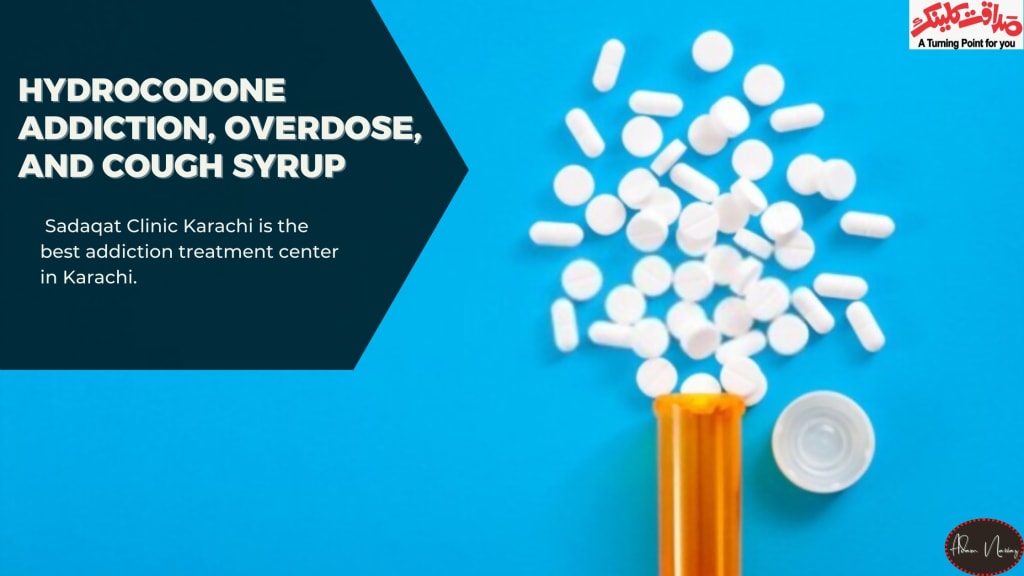Hydrocodone Addiction, Overdose, and Cough Syrup
The addiction of Hydrocodone is increasing as it can become worse.

If you or a loved one has suffered from addiction visit the best addiction treatment center in Karachi the hell of Hydrocodone addiction, I'm sure the origins of the drug would be of interest. With prescription drug addiction at an all time high, celebrities falling left and right, and ongoing investigations of What We All Need to Know About Drug Addiction with possible manslaughter charges pending, it shouldn't surprise the high probability of hydrocodone addiction, overdose, and death has been known since its inception.
Unfortunately, even with the likes of Anna Nicole Smith, Heath Ledger, Michael Jackson, Brittany Murphy, and the Johnson and Johnson heiress Casey Johnson dying from prescription Sadaqat Clinic Karachi drug addiction resulting in overdose and death, responsibility is yet to be taken as there is lots of money yet to be made. Although the latter two celebrity causes of death have yet to be finalized, sources close to the deceased highly suspect prescription drug overdose as the cause.
Hydrocodone was first evolved in the 1920s by the German drug organization Glade. Hydrocodone is made by joining a hydrogen particle to codeine atoms. When Hydrocodone was first delivered, Glade accepted that this interaction would make the codeine simpler on the stomach and less harmful to the client. Hydrocodone compulsion was a worry anyway authorities selected to take the least damaging options or overlook the alerts for benefit.
At the time, sedative compulsion was a mounting issue for authorities across the U.S. A vast number of individuals were becoming dependent on the sedative fixings tracked down in the most famous hack syrups of the day. Toward the finish of the 1920s, the U.S. Department of Social Cleanliness supported a concentrate by the Public Exploration Board to inspect Hydrocodone and other medicinal compounds as an option, less-habit-forming pain relievers.
Dr. Nathan Eddy, a well known pharmacologist with the University of Michigan, headed up the study. He studied the safety and effects of several drugs, such as morphine, codeine, and the newly developed Hydrocodone.
After a series of ethically-questionable tests on cats to determine the "analgesic" effect of the drugs, Eddy found Hydrocodone was one of the most effective drugs in the study in terms of pain killing effectiveness and the predictability of its side effects. There was, however, a problem with Hydrocodone, as the drug created a tremendous euphoric effect in the animals studied. Dr. Eddy felt Hydrocodone was powerful and had a high potential for addiction.
Dr. Eddy's warnings about hydrocodone addiction went unheeded Hydrocodone has become a hit across the country and is responsible for countless overdoses and deaths.
The current state of Hydrocodone follows suit as on March 11th of 2008, the Food and Drug Administration (FDA) issued a public health advisory concerning the safety of UCB's Tussionex Pennkinetic Extended-Release Suspension, a prescription cough medicine containing Hydrocodone and the antihistamine chlorpheniramine.
The FDA noted two specific issues. First, the cough medicine was improperly prescribed for children under age six. Children this young have a particular susceptibility to respiratory depression, a life-threatening condition brought on by hydrocodone overdose, and therefore use of a product such as Tussionex is contraindicated. The FDA has received reports of death in patients less than six years old due to respiratory depression.
Secondly, the FDA found that Tussionex has been prescribed more frequently than the labelled dosing interval of every 12 hours. In addition, misinterpretation of dosing directions and patient use of inappropriate measuring devices has led to excessive product dosing. Life-threatening breathing problems and death have been associated with hydrocodone overdose in older children, adolescents, and adults.
Some symptoms of hydrocodone overdose include:
- trouble breathing
- slow or shallow breathing
- slow heartbeat
- severe sleepiness
- cold, clammy skin
- trouble walking or talking
- feeling faint, dizzy, or confused.
The side effects of Hydrocodone should indicate the toxicity level, the high probability of Hydrocodone addiction, and the need for treatment if hydrocodone abuse occurs.
About the Creator
Willing Ways
Willing Ways is the Best addiction treatment center in Pakistan. We are the pioneer in drugs & alcohol treatment centers with outstanding services and a history of 43 years. We deliver quality writing that is beneficial for you.






Comments
There are no comments for this story
Be the first to respond and start the conversation.